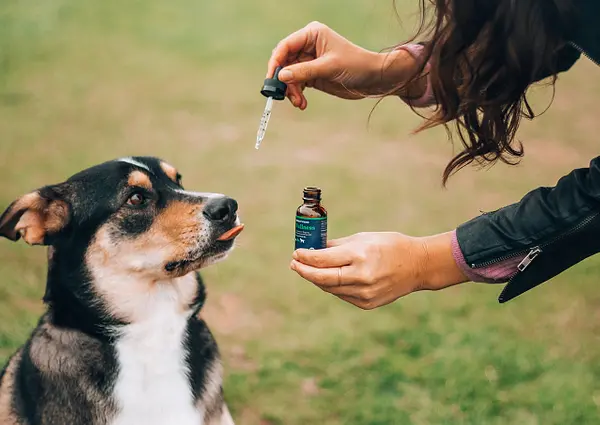Common Questions About CBD For Dogs: What Every Pet Owner Should Know
CBD, or cannabidiol, has gained significant attention in recent years for its potential health benefits, not just for humans but also for our beloved four-legged friends. As more pet owners explore the use of CBD for dogs, a multitude of questions arise. Is it safe for dogs? What are the potential benefits? How should you administer it? In this comprehensive guide, we aim to address the most common questions about CBD for dogs, providing you with the information you need to make informed decisions for your pet’s well-being.
What Is CBD, And Is It Safe For Dogs?
Cannabidiol (CBD) is a natural compound found in the cannabis plant. Unlike its cousin THC (tetrahydrocannabinol), CBD is non-psychoactive and does not produce the “high” associated with marijuana. It’s important to note that CBD products for dogs are typically derived from hemp, which contains very low levels of THC, ensuring they are non-intoxicating and safe for pets.
Numerous studies have shown that CBD is generally safe for dogs when administered correctly and in appropriate doses. However, it’s crucial to use high-quality CBD products specifically designed for pets and consult with your veterinarian before starting any CBD regimen.
What Are The Potential Benefits Of CBD For Dogs?
CBD has been studied for its potential therapeutic effects in dogs, and while research is ongoing, there are several potential benefits that have been reported anecdotally and in some preliminary studies:
A. Pain Management: CBD may help manage pain and inflammation in dogs, making it beneficial for conditions like arthritis, injuries, and post-surgical recovery.
B. Anxiety And Stress Reduction: CBD can have calming effects and may help alleviate anxiety, separation anxiety, and situational stress in dogs.
C. Seizure Control: Some research suggests that CBD may be effective in reducing the frequency and severity of seizures in dogs with epilepsy.
D. Improved Appetite And Nausea Relief: CBD may help stimulate appetite in dogs experiencing loss of appetite or nausea due to various health issues.
E. Skin And Coat Health: CBD’s anti-inflammatory properties may contribute to healthier skin and a shinier coat in dogs.
How Should I Administer CBD To My Dog?
Administering CBD to your dog can be done in various ways, and the method you choose may depend on your pet’s preferences and the specific product you’re using:
A. CBD Oil/Tinctures: This is one of the most common methods. You can mix the recommended dose of CBD oil into your dog’s food or administer it directly under their tongue for faster absorption.
B. CBD Treats: Many companies offer CBD-infused treats that make dosing more convenient and enjoyable for dogs.
C. Capsules Or Pills: These can be a good option for precise dosing, especially for larger dogs.
D. Topical Creams: For skin issues or localized discomfort, you can apply CBD-infused creams directly to the affected area.
Always follow the dosing instructions provided by the manufacturer, and it’s advisable to start with a lower dose and gradually increase it while monitoring your dog’s response.
How Do I Determine How Much CBD My Dog Should Consume?
The appropriate CBD dosage for your dog can vary based on factors such as their size, weight, and specific health condition. It’s crucial to consult with your veterinarian before starting CBD to ensure the correct dosage and to rule out any potential interactions with existing medications.
As a general guideline, many experts recommend starting with a low dose of around 0.2mg to 0.5mg of CBD per pound of your dog’s body weight. For example, if your dog weighs 30 pounds, you might start with 6-15mg of CBD per day and adjust as needed based on their response.
Monitoring your dog’s behavior and overall condition is essential when determining the optimal dosage. Keep an eye out for improvements in their symptoms without any adverse effects.
Is It Legal To Give CBD To My Dog?
The legality of CBD products for pets varies from one region to another. In many countries and states, CBD derived from hemp with less than 0.3% THC is legal for both human and pet use. However, it’s crucial to check your local laws and regulations regarding CBD for pets to ensure compliance.
Are There Any Potential Side Effects Of CBD For Dogs?
While CBD is generally considered safe for dogs, some pets may experience mild side effects, which can include:
A. Dry Mouth: CBD may reduce saliva production, causing increased thirst.
B. Drowsiness: In some cases, CBD can have a calming effect that may result in drowsiness.
C. Changes In Appetite: CBD can either increase or decrease your dog’s appetite, depending on their individual response.
It’s essential to monitor your dog closely when introducing CBD and consult your veterinarian if you notice any unusual or concerning side effects.
Can I Use CBD To Replace Other Medications For My Dog?
CBD should not be used as a substitute for prescribed medications or treatments recommended by your veterinarian. It can be used as a complementary therapy to enhance your dog’s overall well-being, but it’s essential to discuss any potential interactions between CBD and your pet’s existing medications with a veterinary professional.
How Do I Choose A High-Quality CBD Product For My Dog?
Selecting a reputable CBD product is vital for your dog’s safety and effectiveness.
A. Look For Products Specifically Formulated For Pets: These products are designed with your dog’s needs in mind.
B. Check For Third-Party Testing: Reputable companies often provide lab reports from independent testing to verify the potency and purity of their products.
C. Consider Full-Spectrum Vs. Isolate: Full-spectrum CBD products contain a broader range of beneficial compounds from the hemp plant, while isolates contain pure CBD. Discuss the best option with your veterinarian.
D. Read Customer Reviews: Real user experiences can provide valuable insights into the effectiveness of a product.
How Long Does It Take For CBD To Work In Dogs?
The time it takes for CBD to take effect in dogs can vary depending on several factors, including the administration method and the dog’s individual metabolism. In general, you may start to see results within 30 minutes to a few hours after administering CBD. For chronic conditions, it may take several days or even weeks of consistent use to observe significant improvements.
Should I Consult My Veterinarian Before Giving My Dog CBD?
Yes, it’s highly advisable to consult with your veterinarian before giving your dog CBD. Your vet can provide guidance on the appropriate dosage, potential interactions with existing medications, and the suitability of CBD for your pet’s specific condition. Their expertise will help ensure the safest and most effective use of CBD for your furry companion.
Conclusion
CBD for dogs has the potential to offer numerous health benefits, but it’s essential for pet owners to approach it with care and responsibility. Always consult with your veterinarian, choose high-quality products, and monitor your dog’s response closely. With the right guidance and attention, CBD may become a valuable addition to your pet’s wellness routine, contributing to their overall health and happiness.
Stay in touch to get more updates & news on Discover Tribune!



